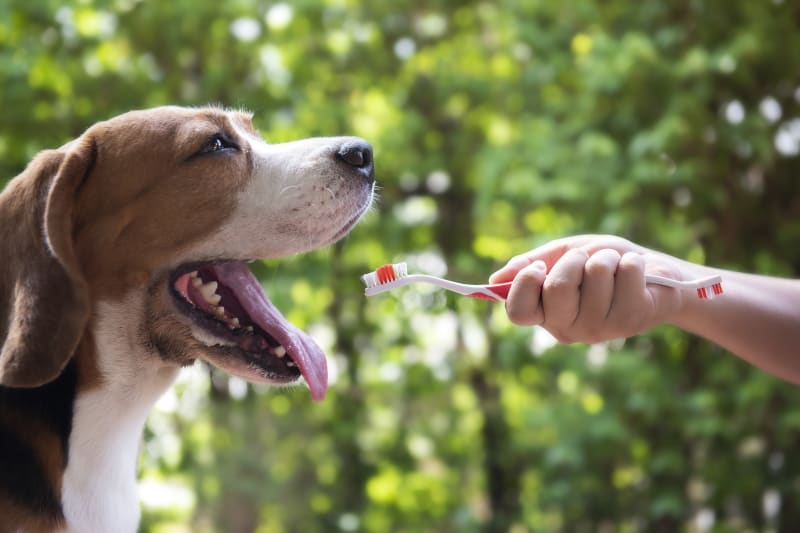Why does my dog's breath smell so bad?
There's a reason 'dog breath' is a common saying! Dogs can often have some smell to their breath from playing, chewing, eating, and generally living their lives. However, if their normal breath smell changes and becomes excessively bad it can often be a sign of an underlying problem.
There are a number of different possible causes of bad breath in your dog, but the most common are kidney disease, liver disease, and oral health issues.
Kidney Disease
If your dog's bad breath smells like feces or urine, it may be a sign that they have recently eaten poop (which is never fun for a dog parent) or a symptom of underlying kidney issues.
When a dog's kidneys aren't functioning properly they have trouble filtering toxins and waste materials which can cause them to build up in their body. Bad breath is a common symptom of kidney problems in dogs, especially when combined with pale gums or mouth ulcers.
Liver Disease
If your dog has recently developed seriously bad breath and their new scent is accompanied by other concerning symptoms like vomiting and diarrhea, liver disease may be the root cause of their symptoms.
Oral Health Issues
Oral health issues are the most common cause of bad breath in dogs. Used as an umbrella term, oral health covers a range of issues from tooth decay, to gum disease and oral infections.
Most cases of bad breath in dogs are caused by a build-up of bacteria and food debris over time and can create an unpleasant smell if your pup's mouth is not regularly cleaned. If left unchecked, minor oral health issues can progress into larger problems and negatively impact your dog's overall health.
How is bad breath in dogs treated?
The reason why your dog has bad breath will largely influence the kind of treatment they will require. Since bad breath can be a sign of an underlying condition rather, it is important to treat the root cause of the problem.
If you notice a change in the smell of your dog's breath, it's always important to bring your dog to your vet so they can receive a proper examination, diagnosis, and treatment options.
Treatments at your vets can range from prescription medications, specialized diets, therapies, or even surgeries to help treat your pet's underlying condition, depending on the diagnosis. Your vet will be able to advise you on what the best course of treatment is for the health issue underlying your pup's bad breath.
How do I prevent bad breath issues in my pup?
One way you can help to treat or prevent bad breath in your dog is ensuring your pup gets the routine oral hygiene care they need, in addition to annual professional dental cleanings.
You should brush your dog's teeth regularly. It is important to start this process as a puppy if possible to help get them used to the experience of tooth brushing. In combination with tooth brushing, or if your pup is intolerant to brushing, there are a wide variety of dental chews and food options that help promote oral health.
Ask your vet what kinds of oral health products they recommend for helping your dog to stave off bad breath.
Larger issues, like kidney or liver disease, can't always be prevented but you should take extra caution to ensure your dog isn't consuming anything they shouldn't. Some human medications, foods, and common houseplants can be toxic to dogs and contribute to liver and kidney issues. Be aware of what kinds of substances you have in your home that could cause organ disease or failure in your pooch and keep them out of reach as much as possible.
Note: The advice provided in this post is intended for informational purposes and does not constitute medical advice regarding pets. For an accurate diagnosis of your pet's condition, please make an appointment with your vet.
Have you noticed a change in the way your dog's breath smells? Contact Western Carolina Animal Hospital to book an appointment for your canine companion as soon as possible to have the cause of their bad breath diagnosed and treated.
Looking for a vet in Flat Rock?
We're always accepting new patients, so contact our veterinary hospital today to book your pet's first appointment.Related Articles View All
Caring for a Dog With a Broken Jaw
Broken jaws are surprisingly common in dogs. In today's post, you will learn about the most common causes of broken jaws in dogs, how they can be repaired, and advice on caring for your pup as their jaw heals.
Best Small Dog Breeds for Apartment Living
You’ve decided to add a furry family member to your household but you're just not sure what breed to get. Here, we share a little information about some of the best small dogs for apartment living.
What does ringworm look like on a dog?
Contrary to its name, ringworm is a fungus comparable to athlete's foot. It produces infective seeds known as spores, which are highly resilient and difficult to eliminate in the environment. Ringworm may infect the skin of dogs and other animals. Today, our vets in Flat Rock discuss ringworm in dogs and what it looks like.
Dog Dental Care: How to Take Care of Your Dog's Teeth
Dogs can be impacted by tooth decay and gum disease just like people can. That's why caring for your dog's teeth is an important aspect of protecting their overall health. In today's post, our Flat Rock vets share tips on how to clean your dog's teeth and more.

